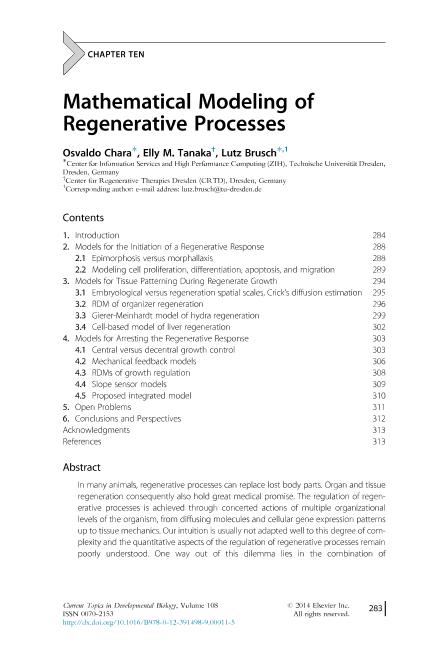Mostrar el registro sencillo del ítem
dc.contributor.author
Chara, Osvaldo

dc.contributor.author
Tanaka, Elly M.
dc.contributor.author
Brusch, Lutz
dc.date.available
2018-01-05T17:54:29Z
dc.date.issued
2014-02
dc.identifier.citation
Brusch, Lutz; Chara, Osvaldo; Tanaka, Elly M.; Mathematical modeling of regenerative processes; Elsevier Academic Press Inc; Current Topics In Developmental Biology; 108; 2-2014; 283-317
dc.identifier.issn
0070-2153
dc.identifier.uri
http://hdl.handle.net/11336/32407
dc.description.abstract
In many animals, regenerative processes can replace lost body parts. Organ and tissue regeneration consequently also hold great medical promise. The regulation of regenerative processes is achieved through concerted actions of multiple organizational levels of the organism, from diffusing molecules and cellular gene expression patterns up to tissue mechanics. Our intuition is usually not adapted well to this degree of complexity and the quantitative aspects of the regulation of regenerative processes remain poorly understood. One way out of this dilemma lies in the combination of experimentation and mathematical modeling within an iterative process of model development/refinement, model predictions for novel experimental conditions, quantitative experiments testing these predictions, and subsequent model refinement. This interdisciplinary approach has already provided key insights into smaller scale processes during embryonic development and a so-far limited number of more complex regeneration processes. This review discusses selected theoretical and interdisciplinary studies and is structured along the three phases of regeneration: (1) initiation of a regeneration response, (2) tissue patterning during regenerate growth, (3) arresting the regeneration response. Moreover, we highlight the opportunities provided by extensions of mathematical models from developmental processes toward the study of related regenerative processes.
dc.format
application/pdf
dc.language.iso
eng
dc.publisher
Elsevier Academic Press Inc

dc.rights
info:eu-repo/semantics/openAccess
dc.rights.uri
https://creativecommons.org/licenses/by-nc-sa/2.5/ar/
dc.subject
Mathematical Model
dc.subject
In Silico Model
dc.subject
Simulation
dc.subject
Computational Biology
dc.subject
Systems Biology
dc.subject
Regeneration
dc.subject.classification
Otras Ciencias Biológicas

dc.subject.classification
Ciencias Biológicas

dc.subject.classification
CIENCIAS NATURALES Y EXACTAS

dc.title
Mathematical modeling of regenerative processes
dc.type
info:eu-repo/semantics/article
dc.type
info:ar-repo/semantics/artículo
dc.type
info:eu-repo/semantics/publishedVersion
dc.date.updated
2018-01-03T19:03:45Z
dc.journal.volume
108
dc.journal.pagination
283-317
dc.journal.pais
Estados Unidos

dc.journal.ciudad
Burlington
dc.description.fil
Fil: Chara, Osvaldo. Technische Universität Dresden. Dresden; Alemania. Consejo Nacional de Investigaciones Científicas y Técnicas. Centro Científico Tecnológico Conicet - La Plata. Instituto de Física de Líquidos y Sistemas Biológicos. Universidad Nacional de La Plata. Facultad de Ciencias Exactas. Instituto de Física de Líquidos y Sistemas Biológicos; Argentina
dc.description.fil
Fil: Tanaka, Elly M.. Center for Regenerative Therapies Dresden. Dresden; Alemania
dc.description.fil
Fil: Brusch, Lutz. Technische Universität Dresden. Dresden; Alemania
dc.journal.title
Current Topics In Developmental Biology

dc.relation.alternativeid
info:eu-repo/semantics/altIdentifier/doi/http://dx.doi.org/10.1016/B978-0-12-391498-9.00011-5
dc.relation.alternativeid
info:eu-repo/semantics/altIdentifier/url/http://www.sciencedirect.com/science/article/pii/B9780123914989000115
Archivos asociados
